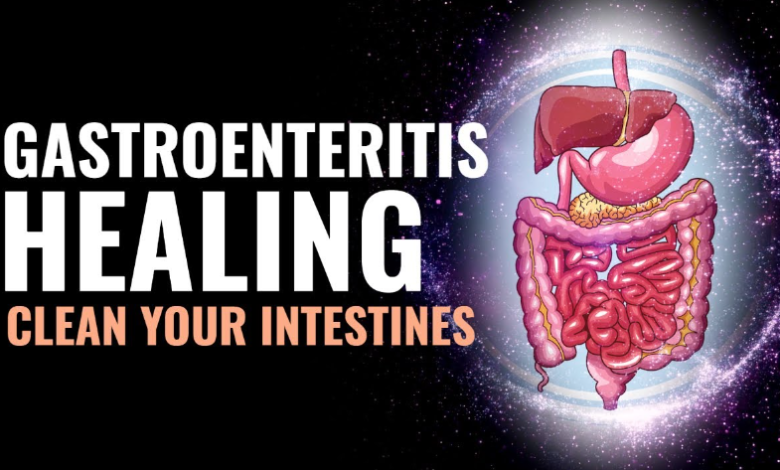Wellhealthorganic.Com: Spotting Gastroenteritis Symptoms

Critical signs of gastroenteritis include diarrhoea, vomiting, abdominal pain, and fever. Dehydration is another critical indicator.
Gastroenteritis, often known as the stomach flu, triggers distinct symptoms that can severely impact daily life. Viral or bacterial infections typically cause this condition and can spread quickly if proper hygiene practices are not followed. Being aware of the early symptoms—such as persistent stomach cramps, nausea, and loss of appetite—allows for timely intervention and recovery.
Educating individuals about handwashing, safe food handling, and recognizing gastroenteritis signs is crucial for preventing outbreaks. By staying informed and attentive to these key symptoms, people can take swift actions like consulting healthcare professionals and ensuring adequate fluid intake to mitigate the condition’s impact.
Contents
Introduction To Gastroenteritis
Imagine your stomach feeling like a stormy sea. This might be gastroenteritis. It means your stomach and intestines are inflamed. Vomiting, diarrhoea, and tummy pain are common signs. It’s often called a stomach bug. Viruses, bacteria, or parasites can cause it.
What Is Gastroenteritis?
Gastroenteritis is an unwelcome guest in your digestive system. It battles your stomach and intestines. It leads to symptoms like dehydration. It can affect anyone, from tiny toddlers to grown adults.
Why Gastroenteritis Needs Attention
Ignoring gastroenteritis is a bad idea. Dehydration is a considerable risk. Without treatment, symptoms can worsen. It’s important to know when to seek help. Quick action can lead to a smoother recovery.
Common Triggers Of Gastroenteritis
Understanding what sparks gastroenteritis is vital. This knowledge can help prevent and manage symptoms effectively. Gastroenteritis triggers often relate to what we ingest.
Infectious Pathogens
Bugs cause most gastroenteritis cases. Here’s who the usual suspects are:
- Viruses: Norovirus and rotavirus lead the charge.
- Bacteria: Salmonella and E. coli are common culprits.
- Parasites: Think Giardia or Cryptosporidium.
Contaminated Food And Water
Unsafe food and water are significant risk factors. Here’s how they impact you:
| Source | Risk |
| Uncooked foods | May carry bacteria or parasites |
| Raw meat | A potential source of harmful organisms |
| Untreated water | Can contain pathogens that trigger illness |
Always opt for safe, cooked meals and boiled or bottled water.
Early Signs Of Gastroenteritis
Gastroenteritis, often called the stomach flu, is an inflammation of the stomach and intestines. It starts suddenly and can strike anyone. Knowing the early signs is crucial for quick recovery. Let’s explore some of these initial red flags.
Stomach Pain And Cramps
Stomach pain is a standard first alert to gastroenteritis. It feels like your stomach is tied in knots. These cramps can vary from mild to severe. People often describe it as a gripping or gnawing pain.
- Sharp, intermittent stomach ache
- Cramping that comes in waves
- A strong urge to lie down or curl up
Nausea And Vomiting
With gastroenteritis, you might feel very queasy. This could lead to vomiting. Getting sick to your stomach is your body’s way of clearing the virus or bacteria.
- Sudden urge to throw up
- Feeling sick after eating
- Repeated episodes of vomiting
Understanding The Symptoms
Gastroenteritis strikes without much warning. Recognizing key symptoms quickly leads to quicker recovery.
Diarrhea
Diarrhea is the telltale sign of gastroenteritis. It occurs as frequent, watery stools. This symptom means the stomach and intestines are inflamed. Look for these clues:
- Three or more loose stools in a day
- Urgent need to go to the bathroom
- Abdominal cramps and discomfort
Fever And Chills
An increase in body temperature often comes with gastroenteritis. Fever and chills can indicate the body is fighting off an infection. Check for:
- Sweating or shivering despite the room temperature
- Higher than average temperature on a thermometer
- Weakness or dizziness accompanying the fever
Severe Symptoms Warranting Immediate Care
Recognizing severe symptoms of gastroenteritis is crucial for getting the proper care quickly. Some symptoms suggest that immediate medical attention is necessary. Let’s explore these severe symptoms.
Blood In Vomit Or Stools
Finding blood in vomit or stools is a serious sign. This symptom can indicate a severe infection or another underlying condition. In vomit, it can look like red streaks or a coffee-ground appearance. In stools, it might be bright red or black. If you notice blood, seek medical help at once.
Dehydration Signs
Dehydration can happen fast and be very dangerous. If you see these signs, get care right away:
- Dry mouth or skin
- Intense thirst
- There are few or no tears when crying
- Little or no urine for eight hours
- Dark, concentrated urine
- Rapid heartbeat or breathing
- Dizziness when standing up
Risk Groups And Complications
Gastroenteritis, often known as the stomach flu, can affect anyone. Yet, some people face higher risks than others. Recognizing who is most vulnerable can help in prevention and timely care. Complications can be severe, so it’s crucial to understand what might arise.
High-risk Individuals
Certain groups are more susceptible to gastroenteritis. These include:
- Babies and young children who have weaker immune systems.
- Older adults, especially those with chronic diseases.
- People with weakened immune systems due to conditions like HIV/AIDS or cancer treatments.
- Travellers are visiting countries with high rates of gastroenteritis.
>>Also Read About: Wellhealthorganic Vitamin B12
Potential Complications
Not dealing with gastroenteritis promptly can lead to severe issues. Complications may include:
| Complication | Description | Treatment Suggestion |
| Dehydration | Loss of fluids can be dangerous. | Increase fluid intake and electrolytes. |
| Malnutrition | Poor nutrient absorption. | Seek balanced diets post-recovery. |
| Chronic digestive problems | Long-term gut issues may arise. | Consult a gastroenterologist early. |
Diagnosis Of Gastroenteritis
When your stomach feels upset, you might wonder what’s wrong. Gastroenteritis can be the cause. It’s essential to know how doctors find out if you have it. Today, let’s learn how they do this.
Medical History And Physical Examination
The first steps in diagnosing gastroenteritis involve talking and checking. Doctors ask questions about your symptoms, including when you started feeling sick. They will also ask about things like nausea, vomiting, diarrhoea, and any recent travel or food intake. Then, they give you a physical exam. This exam helps them look for signs like belly pain or dehydration.
Laboratory Tests
Sometimes, doctors need more information. They use laboratory tests to find out what’s making you ill. These can include:
- Stool tests: to look for viruses, bacteria, or parasites.
- Blood tests: to check for dehydration or other issues.
- Urine tests: to rule out other causes for your symptoms.
Treatment Options
Knowing how to treat gastroenteritis is essential to ease symptoms. Let’s explore both home-care remedies and medical treatments. Effective management can bring relief swiftly. Key options range from simple at-home care to professional medical help.
Home-care Remedies
Simple home-care methods can alleviate gastroenteritis symptoms. Begin with staying hydrated, which is crucial in recovery.
- Drink fluids regularly: water, broth, or oral rehydration solutions.
- Rest: Ensure ample sleep and relaxation to aid the body’s healing.
- Bland diet: Eat foods easy on the stomach, like bananas, rice, and toast.
- Avoid dairy, caffeine, alcohol, and fatty or highly seasoned foods.
>>Also Read About: Wellhealthorganic Home Remedies Tag: Natural Cure Secrets
Medical Treatments
Professional medical interventions might become necessary. They ensure proper care and prevent complications.
| Medication | Purpose |
| Anti-nausea medicine | Reduces feelings of nausea and prevents vomiting. |
| Antidiarrheal agents | It helps in managing diarrhoea and discomfort. |
| Antibiotics | Used when gastroenteritis is bacterial. Not suitable for viral infections. |
Consult a doctor to discuss the best treatment plan. Sometimes, hospitalization is necessary for severe dehydration or persistent symptoms.
Prevention And Control
Gastroenteritis, or the stomach flu, causes discomfort and can spread quickly. Understanding how it propagates and adopting preventive measures are the keys to preventing and controlling this illness. This section offers actionable steps for keeping gastroenteritis at bay. Protect yourself and your loved ones by following these guidelines. Keep in mind that simple actions can lead to significant health benefits.
Hygiene And Sanitation
Maintaining good hygiene and sanitation is crucial in warding off gastroenteritis. This illness often spreads via contaminated food or water, making cleanliness a top priority. By adhering to these steps, the risk of infection is minimized dramatically.
- Wash hands thoroughly with soap and water, especially after using the restroom and eating.
- Use alcohol-based sanitizers if soap and water are not available.
- Clean surfaces in your home regularly, especially kitchen and bathroom areas.
- Ensure food is cooked correctly and stored to prevent contamination.
- Avoid sharing personal items like utensils, towels, and toothbrushes.
Vaccinations
Vaccines can offer protection against certain types of gastroenteritis. For instance, rotavirus vaccines effectively prevent infections among infants and young children. To keep everyone safe, consider following these recommendations:
- Speak with a healthcare provider about vaccines suitable for your family.
- Ensure vaccinations are up-to-date according to local health guidelines.
- If travelling abroad, ask about additional vaccines to prevent traveller’s diarrhoea.
Conclusion
Recognizing the signs of gastroenteritis is crucial for timely treatment and recovery. You are armed with the knowledge from Wellhealthorganic. Com, be vigilant about changes in your digestive health. Seek medical advice if symptoms persist or worsen. Remember, early intervention can make all the difference.
>>Also Read About: Well Health How to Build Muscle Tag



